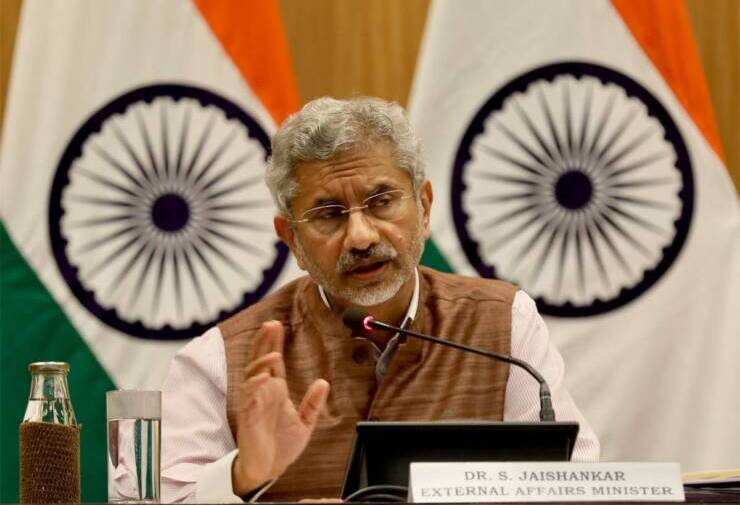
New Delhi: External Affairs Minister S Jaishankar told Israeli diplomats to understand the “profound changes” underway in India post-COVID-19 pandemic and utilise the fundamental and deep comfort enjoyed by the two sides to further the “forward and upward trajectory” in bilateral ties.
Addressing Israeli Heads of Missions in the Asia-Pacific region as a guest of honour invited by his Israeli counterpart Gabi Ashkenazi to share his perspective of the developments shaping the world, spoke about the contemporary global situation, India’s foreign policy outlook, the Indo-Pacific and India-Israeli cooperation.
“India is right now going through profound changes,” the minister said while speaking via video link.
He highlighted the major reforms underway in India in the field of agriculture, labour, manufacturing and education, demonstrating the Indian government’s will to come out of the challenges of 2020 with a positive mind rather than starting on a defensive note.
He asked the Israeli diplomats to utilise the fundamental and deep comfort enjoyed by the two sides to further the “forward and upward trajectory” in bilateral relations.
Recalling the days when Indian and Israeli officials would meet at foreign destinations before diplomatic relations were established in 1992, Jaishankar emphasised that the “relationship finally enjoys the stature and visibility it deserves” which is based on “deep societal contacts”.
Besides the cooperation in defence, Jaishankar also highlighted the productive collaboration between the two countries in the field of agriculture, water, and shared interests in start-ups and innovation which has come into prominence due to “similar mindsets”.
Touching upon the state of the world, the minister with decades of field experience, brought out 10 attributes of the world today that affect everyone.
Ongoing re-balancing, contestation rather than conflict as a process of change, movement towards multi-polarity, weakening of multilateralism, de-globalisation, weakening of old alliances, new attributes of power, a plurilateral world, rise of big tech and borderless politics were some of the attributes that the minister delved upon in his presentation with specific references.
As far as India’s approach is concerned, he stressed that New Delhi is looking at the world in “concentric circles” with a “Neighbourhood First” approach that has guided several of its recent actions.
“India’s economic rise has an uplifting influence on the entire neighbourhood. We are interested to see the entire region making progress,” Jaishankar said.
However, the Indian endeavour has been to go global and not to be restricted by geographies, he asserted.
Calling upon to deal with countries in the Asia and Pacific region, a relatively new lexicon, as a seamless and integrated region, Jaishankar also highlighted the importance of the Gulf, which is home to nine million Indians, Africa and other parts of the world for India.
He said that India is pursuing a policy of “realism, which is positive”.
Describing Israel as part of India’s extended neighbourhood, he said New Delhi has been closely following the developments in the region as it can “impact us” as well.
He pointed out that New Delhi was among the first ones to back the Abraham Accords a US-brokered deal to normalise Israel’s ties with countries in the Arab world.
Jaishankar expressed appreciation of how Israel had “customised every relationship” with countries in the region, something from which a lot could be learnt.
“Pleased to address the Israeli Asia-Pacific Ambassadors Conference. Spoke about the contemporary global situation, India’s foreign policy outlook, the Indo-Pacific and India-Israeli cooperation. Thank FM @Gabi_Ashkenazi for the opportunity,” Jaishankar tweeted after his address.
Earlier while introducing Jaishankar, Ashkenazi said that he could “hardly” find any other Foreign Minister with Jaishankar’s experience and it would “be interesting to hear your perspective on the challenges we are facing”.
The Israeli foreign minister also recalled that his first call to a counterpart abroad after taking charge was to Jaishankar given the “strategic partnership” enjoyed by the two countries, which is also a “special” relationship.
“India is a regional power and a strategic partner for Israel. Next year we will celebrate 30 years of diplomatic relations between the two countries. Our relations are based on an understanding of common interests that complement each other and form a broad cushion for security, water, agriculture, health, and centers of excellence,” Ashkenazi noted.
He said the relationship between the two countries is based on democratic values and common interests which create a broad cushion for cooperation in the fields of security, innovation, water, agriculture and health.
Gilad Cohen, Deputy Director General of the Ministry of Foreign Affairs for Asia and the Pacific, in his opening remarks at the start of the conference said that “the Asian continent is the global engine of growth and the Ministry of Foreign Affairs attaches increasing importance to economic diplomacy”.
Appreciating Jaishankar’s address and his understanding of the global order, Israel’s Consul General in Mumbai, Yaacov Finkelstein, tweeted, “A clear and profound review by India’s Minister of External Affairs, @DrSJaishankar Ji. I learned a lot”.








